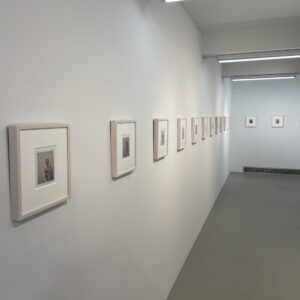JTF (just the facts): A total of 21 black-and-white photographs, matted in black frames and hung against white walls. All the works are gelatin silver prints made by the Rotimi Fani-Kayode estate (each with a certificate of authenticity supplied and signed by Autograph ABP), dated between 1985/2018 and 1989/2018. Seventeen of the prints measure roughly 18×17 inches framed, and the other 4 prints measure roughly 22×15 inches framed (or the reverse). All the works in the show are available in editions of 5+1PP, except Bronze Head, from 1987/2018, which is available in an edition of 10+1PP. (Installation shots below.)
Comments/Context: By his own account, Nigerian-born photographer Rotimi Fani-Kayode (1955–1989) was an outsider on three fronts: as an immigrant, a homosexual, and an artist. In his photographs, however, he created a world in which these things were celebrated as essential to his own identity.
When Fani-Kayode was 11, his politically connected Yoruba father moved the family to England ahead of the Biafran Civil War. In 1983, after attending George Washington University in Washington, D.C. and Pratt Institute in New York, Fani-Kayode returned to London. There, he embarked on an art career that lasted a mere six years until his death from AIDS at 34, one defined by his search for a new language of representation.
With others, Fani-Kayode founded Autograph ABP (Association of Black Photographers), a group supporting the use of non-traditional photographic subjects and forms to describe experiences and points of view specific to black identity and culture. “It is now time for us to re-appropriate [exploitative] images,” he wrote in a 1988 essay, “and to transform them ritualistically into images of our own creation. For me, this involves an imaginative investigation of Blackness, maleness, and sexuality, rather than more straightforward reportage.”
His own work took the form of color and black-and-white photographs of staged tableaux, sometimes created with his romantic partner Alex Hirst. In them, naked or costumed black men engage in mysterious theaters seemingly rooted in theorist Stuart Hall’s “diasporic imaginary,” as well as in Fani-Kayode’s own erotic and spiritual impulses.
Fani-Kayode’s black-and-white pictures, like those on view here, are restrained in comparison to his more baroque work in color and show a clear debt to the photographs of Robert Mapplethorpe, whom Fani-Kayode met while studying in New York. But in intent and in practice, they are far more complex than Mapplethorpe’s icy depictions of male nudes. They thrum with longing—for wholeness, for transcendence, for healing.
In some of the photographs, simple props—a tangle of plastic tubing; a pair of enormous scissors—respectively suggest connection and rupture. Other images, including one self-portrait in which the artist’s features are obscured with an umbrella, and a second showing him holding a Dan tribal mask, seem to refer to his identity as both a Nigerian and a British subject. Two studies of twins, with their eyes partially or wholly covered, conjure the spirits of Yoruba myth.
“Both aesthetically and ethically,” Fani-Kayode wrote in the same essay, “I seek to translate my rage and my desire into new images which will undermine conventional perceptions and which may reveal hidden worlds.” His work now seems to anticipate that being made by contemporary black photographers and filmmakers such as Leslie Hewitt, Sondra Perry, Deana Lawson, Ja’Tovia Gary, and Texas Isaiah, who are conducting their own versions of Fani-Kayode’s imaginative investigations.
Collector’s POV: All of the works in the show are priced at $4500 framed. Fani-Kayode’s work has little secondary market history, so gallery retail likely remains the best option for those collectors interested in following up.














